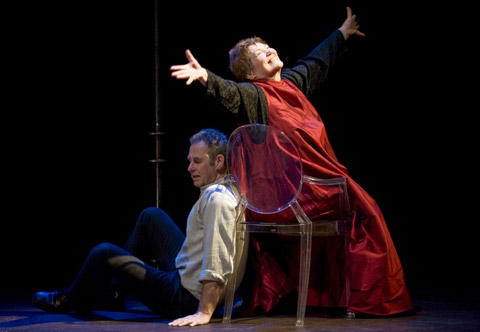
MASTER CLASS Packer is happy to assign “infinite variety” to Shakespeare’s women — including a Kate who is alternately manic, cute, and clinically depressed. |
Tina Packer has been in bed with Shakespeare for at least 40 years. And as founding artistic director of Lenox-based Shakespeare & Company, she enjoys a relationship with literature's alpha dead white male that's more visceral than academic. Now, in Women of Will (presented by Nora Theatre Company at Central Square Theater through November 6), she's ready to kiss and tell. Actually, she's been kissing and telling for a while; this witty, penetrating, idiosyncratic examination of Shakespeare's deepening understanding of the feminine in his psyche has been in the making for 15 years. When I saw it in the '90s, it was performed in three parts that moved chronologically from the early histories and comedies through the late romances. It has since both expanded and contracted: Packer, with her scene partner, Nigel Gore, conducts her exploration as a single work, subtitled The Overview, through October 30, and in five parts, dubbed The Complete Journey, November 4-6.A sort of master class — part lecture, part demonstration — Women of Will alternates among assertions about Shakespeare and the performance (by two accomplished actors steeped to their eyeballs in the Bard) of cuttings from the plays. And though Packer has her theories, she is happy to assign to Shakespeare the "infinite variety" he allots Cleopatra. In The Overview, this is demonstrated from the get-go when Packer offers, in rapid fire, three possible readings of Katherine's final speech from The Taming of the Shrew. Deprived of food, sleep, and, most important, language, this last-act Kate, Packer opines, is either manic, playing cute, or clinically depressed. Then, as Gore's brutal Petruchio drags her about on a leash, she renders the speech, jumping from one interpretation to the next to the next.
Packer proceeds to the leap she perceives in Shakespeare's women from warriors, viragos, and bimbos to the first fully embodied female character in the canon: Juliet, in whom the Bard merges the spiritual with the sexual. Packer is 73 but, as Juliet, trying on her grown-up feelings, she suggests all the quickness of youth — not to mention a puppyish enthusiasm that hints she just might "kill" her Romeo "with much cherishing."
Part Three of Women of Will is called "Living Underground or Dying To Tell the Truth." Packer's point is that the women of Shakespeare's middle period do not fare well when waxing honest in a dress but are granted both license and voice when accoutered as men. By way of demonstration, she and Gore jump back and forth between Orlando wooing the disguised Rosalind in As You Like It and the savage, poignant run-up to the end of Othello. It's a neat trick as the two pros switch back and forth with chameleonic alacrity between the clever vying in Arden and the merciless attack of green-eyed monster on forthright innocence in Othello.
Then, Packer asserts, the Bard fell into a "depression" characterized by the conjuring of women — epitomized by Lady Macbeth, demanding to be "unsexed" — more aligned, in their ruthless ambition, with men. This leads to Packer and Gore's chilling condensation of Macbeth, in which Packer's Lady ricochets between goading and despair and Gore whispers a heartbroken "tomorrow and tomorrow" while cradling her upright corpse in his arms.